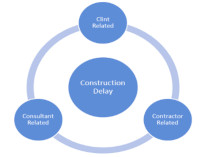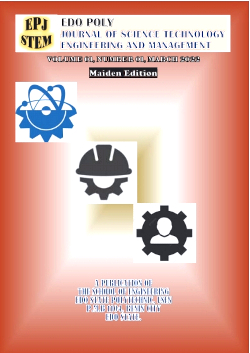Confronting Nigerian Construction Delays through Educational Research
Keywords:
Time overrun, Construction delays, Construction Industry, Educational ResearchAbstract
In order to provide relevant and dependable knowledge, educational research is required. Through this process, the process of education can assist in the development of new techniques and methods that are both more effective and efficient in solving the issue of time overruns in building projects. Every construction project experiences delays, and the magnitude of these delays varies significantly from project to project. In Africa, construction delays are one of the most significant obstacles to the achievement of project objectives. When it comes to construction projects, they are complicated human endeavours that necessitate substantial planning and strict control in order to be effective. The findings of this study show the fundamental categories of elements that contribute to construction delays, and they further demonstrate that educational research can aid in stemming the tide of negativity in the sector.
References
Adrian, B. (2010). Value for money: procuring infrastructure. In Yigitcanlar, Tan (Ed.) Sustainable Urban and Regional Infrastructure Development: Technologies, Applications and Management. Philadelphia: Hershey. Pp. 295-309.
Alkhathami, M.M. (2004). Examination of the correlation of critical success and delay Factors in construction projects in the kingdom of Saudi Arabia. Doctor of Philosophy Thesis: University of Pittsburgh.
Bossom, A. (1934). Reaching for the skies. Available at www.https://becsmog.wordpress.com/page/6/?archives-list&archivestype.
Accessed on February 14, 2015.
Cahill, R. & Puybaraud, K. (1998). Constructing the Team: The Latham Report Construction Reports 1994 – 1998. London: Blackwell Science Limited.
Chan, A. P. C. & Chan, A. P. L. (2004). Key performance indicators for measuring construction success. Benchmarking, an International Journal, Emerald Group
Chiang, Y. H., Tao, L., & Wong, F. K. (2015). Causal relationship between construction activities, employment and GDP: The case of Hong Kong. Habitat International, 46, 1-12.
Designing Buildings wiki, (2017). UK construction industry. www.designingbuildings.co.uk
Egan Report (1998). Rethinking Construction. Report of the Task Force on Construction in the UK led by Sir S. John Egan. London: Department of the Environment, Transport and the Region.
Flores V. and Chase, G. (2005). Project Controls from the Front End. Cost Engineering, April 2005, Volume 47, No. 4, pp. – 24.
Gregori, T. &Pietroforte, R. (2015). An input-output analysis of the construction sector in emerging markets. Construction Management and Economics, 23(2), 134- 145. doi.org/10.1080/01446193.2015.1021704
Idiata, D.J., Ehigiamusoe, B.U and Osagie, E.K (2020). Nigeria Construction Industry Leadership Style and Adaptability Effectiveness: A Case of Civil Engineers. International Journal of Scientific Research & Engineering Trends. Volume 6, Issue 2, Mar-Apr-2020, ISSN (Online): 2395-566X
Jung, Y, Jeong, M.G and Mills, T (2014). Identifying the Preferred Leadership Style for Managerial Position of Construction Management. International Journal of Construction Engineering and Management 2014, 3(2): 47-56 DOI: 10.5923/j.ijcem.20140302.02
Latham Report (1994). Constructing the Team. Report of the Task Force on Construction in the UK led by Sir Michael Latham. Department of the Environment, pp. 14-85.
Laverty, C (2018). Educational Research: Educational Research: A Practical Guide A Practical Guide A. May 2018. Centre for Teaching & Learning. Queen’s University.
Lepatner, B. B. (2007). Broken Buildings, Busted Budgets. Chicago, USA: The University of Chicago Press.
López-Alvarado, J (2017). Educational Research: Educational Purposes, The Nature of Knowledge and Ethical Issues. International Journal of Research and Education (IJRE). Volume 2 Number 1, January-March, ISSN (Online): 2398-3760
Mukuka, M., Aigbavboa, C and Thwala, W (2017). Understanding construction projects schedule overruns in South Africa
Naziev, A (2017). What is an education? International Conference: the future of education. 12 June.
Ogunsemi, D. R. and Aje, I. O. (2006). A model for contractors’ selection in Nigeria. Journal of Financial Management of Property and Construction, Volume 11, No. 1, pp. 21 – 32.
Ojo, S. O. (2009). Development of Framework for the Selection of Appropriate Procurement Methods for Building Projects. Unpublished PhD. (Construction Management) Thesis, Obafemi Awolowo University ,Ile-Ife, September.
Osman, R.M (2017). Educational Research. Education: Education EDU14. African Virtual University (AVU). AVU Multinational Project II funded by the African Development Bank.
Pearce, D for nCRISP (2003) The Social and Economic Value of Construction: The Construction Industry’s Contribution to Sustainable Development, nCRISP: The Construction Industry Research and Innovation Strategy Panel.
Qaytmas, N (2020). Causes of Delays in Construction Projects in Faryab/Afghanistan. International Journal for Research in Applied Sciences and Biotechnology. Volume-7, Issue-6. November. https://doi.org/10.31033/ijrasb.7.6.12
Showkat Rashid Wani, S.R. Edu/Research Methodology/Educational Research. Assistant Professor, DDE, KU, 190002, J&K




